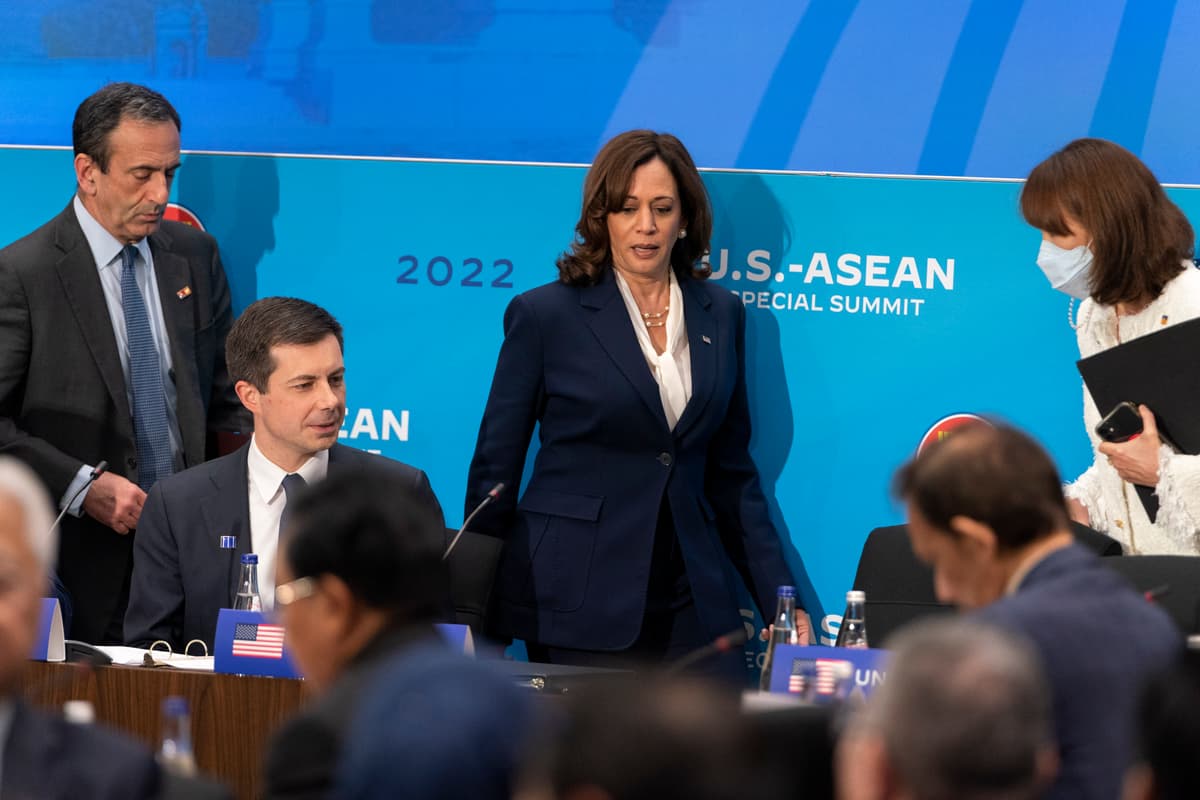If Harris Wins the Presidency, Expect a Softer American Stance on Iran
Harris’s national security adviser, Philip Gordon, is likely to gain a top foreign policy position if she wins the election, and his focus on diplomacy and ties to an Iranian insider could prove problematic in dealings with a hostile Islamic Republic.

Washington’s focus on perceived failures of Israeli diplomacy while ignoring Iran’s regional aggression is bound to intensify if Vice President Harris wins the election, and especially if she promotes her national security adviser, Philip Gordon, to a top foreign policy position.
Israelis and Americans were preparing Friday for Iran-coordinated retaliation following the killings of top terrorists at Beirut and Tehran. Attacks could involve Hezbollah, the Houthis, Hamas, and Syrian and Iraqi militias, as well as Iran itself.
Yet, when President Biden was asked on Friday morning about the killing at Tehran of Hamas’s political chief, Ismail Haniyeh, he ignored Iran. Instead, he berated Israel for failing to agree to a diplomatic initiative to end the Gaza war.
The Tehran killing was “unhelpful,” Mr. Biden said. The president added that during an earlier phone call with Prime Minister Netanyahu, he was “very direct” about the need to conclude a deal for a Gaza cease-fire and the release of some hostages. Israel, he insisted, “should move on it and they should move on it now.”
Mr. Biden’s omission of what the White House insisted in a statement was his commitment — protecting Israel from “threats from Iran, including its proxy terrorist groups Hamas, Hezbollah, and the Houthis” — was telling.
“The over-focus on a Gaza cease-fire deal led the administration to disconnect the dots between proxy and patron, which has been driving the cycle of violence in the Middle East,” an Iran watcher at the Foundation for the Defense of Democracies, Behnam Ben Taleblu, tells the Sun.
Mr. Biden spoke at 1 a.m. EDT Friday alongside Ms. Harris as they awaited the arrival of the hostages released by Russia. “This is just an extraordinary testament to the importance of having a president who understands the power of diplomacy and understands the strength that rests in understanding significance of diplomacy and strengthening alliances,” Ms. Harris said on the occasion.
The statement’s tortured tautological structure was vintage Ms. Harris, who uncharacteristically spoke with no script. Yet, the sentiment behind it — the “power of diplomacy” — has long been a signature of her top foreign policy adviser, Mr. Gordon.
Mr. Gordon was President Obama’s top Mideast adviser when the White House devised the 2015 nuclear deal with Iran. In the Biden administration, he took what was widely seen in Washington as a demotion, national security adviser to the vice president.
His bet may now pay off. If Ms. Harris wins in November, he is likely to have more influence over America’s foreign policy than almost anyone.
Like many of his colleagues, Mr. Gordon spent the four years that Democrats were out of power writing, lecturing, and organizing conferences. His seminal 2020 book was titled “Losing the Long Game: The False Promise of Regime Change in the Middle East.” In a noted New York Times op-ed, he sharply criticized America’s 2020 killing of the top Islamic Revolutionary Guards Corps commander, Qassem Soleimani.
The Times piece, under the headline “The Choice That’s Coming: An Iran With a Bomb, or Bombing Iran,” was run-of-the-mill advocacy of negotiations with the Islamic Republic and eschewing pressure or military attacks. In retrospect, Mr. Gordon’s well-worn arguments were less significant than his co-author for this and two other pieces, Ariane Tabatabai.
Ms. Tabatabai, who now serves as a senior official at the Pentagon, was a member of a group called the Iran Experts Initiative. Unearthed email messages show that she and other group members constantly communicated with Tehran officials. Republicans in Congress claim they in effect served as an Iranian influence organ.
According to leaked emails, Ms. Tabatabai has on several occasions sought Tehran’s advice, including on what to say during a congressional hearing. The activity of the group and its members was exposed, including by the Sun, after the Department of State suspended and stripped the security clearance of its Iran point man, Robert Malley.
“We write to express concern about your national security advisor Mr. Philip Gordon’s connections to Ms. Ariane Tabatabai,” Senators Cotton and Stefanik wrote to Ms. Harris this week, noting that Ms. Tabatabai was “reportedly involved in an Iranian government operation to expand Tehran’s soft power in the United States.”
Both Mr. Gordon and Ms. Tabatabai have been cleared for government positions after detailed security vetting.
Yet, when Mr. Biden entered office, flanked by a host of advocates like Messrs Malley and Gordon, Iran possessed a small batch of low-enriched uranium. Now, after reading classified reports from the director of National Intelligence, Senator Graham concluded this week that “if we do not change course, Iran will, in the coming weeks or months, possess a nuclear weapon.”
Even before possibly attaining a nuclear bomb, though, Iran is employing proxies to burn up the Mideast. Regardless of Mr. Biden’s and Ms. Harris’s affinity for Iran diplomacy, they could soon be forced to “scramble to defend against multi-directional threats from proxies that they have long ignored,” Mr. Ben Taleblu says.

